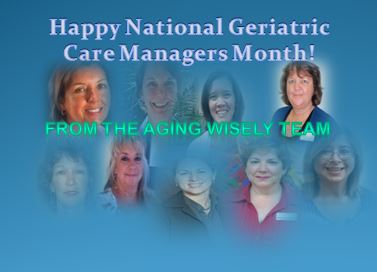Aging Wisely with Care Management
Message from Alex Chamberlain
Geriatric care management plays an important role in our ever evolving healthcare system. Aging Wisely is proud to be at the forefront of addressing these challenges and to have protected the interests of over 700 clients over the past 18 years. When my family founded Aging Wisely, we honored the memory of my great-grandmother and our family’s struggle to care for her with limited options. Over time, we have seen the array of options evolve, but it is no less of a struggle for caregiving families today. Here are some of my thoughts about the valuable role care management can play for elders and families today and into the future.
Every year the government changes the qualifications, rules, and funding for federal and state programs such as Medicare, Medicaid and other government funded programs. Large companies that sell fundamental programs such as insurance and other benefits are trying to reduce costs and adhere to new regulations. At the center of all these changes are seniors, the fastest growing population in the United States. As our population ages, the number of older citizens needing health care support will reach astronomical levels. Aging Wisely stays ahead of all these changes to ensure that clients have sound information for decision-making.
In the past, family members have picked up the burden of helping their aging loved ones navigate the healthcare puzzle. However, the amount of knowledge required to make informed decisions in this complex environment can make this an impossible job for a non-professional. Additionally, family dynamics have shifted and economic pressures mean that adult children may not have the time to invest in learning and navigating these systems. As more families struggle to understand the changing healthcare system, they can make a smart choice in reaching out to Aging Wisely to speak to someone who can provide a complete assessment of their needs and offer expert solutions.
The challenge we find ourselves facing is that many families wait until a crisis before exploring their long term care options. By then, the client and family are physically and emotionally overwhelmed and confused by being bounced around the healthcare system. Waiting until the crisis can really limit your options, leaving you in a less than ideal situation for your remaining years. Engaging Aging Wisely’s services creates options and can help you avoid these pitfalls. Rather than being caught up in the crisis, our professionals can build creative solutions around the client’s wishes, financial situation and a professional assessment. In this way, you and your family gain control and can steer clearly through any crisis that arises.
Aging in Place Minus the Hassle: A Professional Partner Makes All the Difference in Managing In-Home Caregivers
As our population continues to age, many will develop health and logistical issues that make it difficult to live on their own. Most of the clients we meet with prefer to age in place. We always recommend using a state licensed home health agency such as EasyLiving. Despite this, we know that many clients have decided to higher caregivers privately. However, once a client decides to employee privately, the family or other responsible party now becomes responsible for the employment of that individual and all the related supervision and administrative tasks.
Managing an employee can be a daunting and frustrating task for anyone, let alone the elder and family dealing with this for the first time. It also becomes awkward for the client and family to deal with employment problems as they become close and somewhat dependent upon the individual caregiver. Hiring Aging Wisely can be tremendously valuable as Care Managers have a level of expertise that can help families anticipate needs they have not encountered before. A Care Manager can coordinate background screenings, reference checks, drug testing, care plan development, training, and proper documentation. Not only are these issues stressful for elders and their families to deal with, you can easily miss important elements and required duties of privately hiring in home care.
When professionals such as attorneys or financial professionals get involved in helping, they are also taking on the responsibility and associated risks. Having a professional partner to navigate these waters and document key information can greatly mitigate the risks and protect you and your client.
Want to talk about how you and your family can make the choice to age wisely? Or are you a professional who’d like to partner with us to help your clients in a holistic way? Contact me today online or at 727-447-5845 and let’s chat!




 Popular Downloads
Popular Downloads


 Get Our Newsletter!
Get Our Newsletter! Mission Statement
Mission Statement

